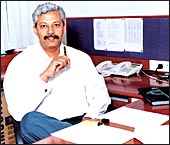 |
"I have
several responsibilities at IBM, so I'm taking several certified
project management courses"
Ranchhod Yagnik
Industry Solutions Leader/IBM India |
| Help,
Tarun! |
| The
Money Makers |
As
the Indian IT industry continues on its rapid evolution (pardon
the apparent oxymoron), tech companies are finding it imperative
to hire people from other, non-it related sectors. Software engineers
have been the industry's staple diet since its inception, but
its transition up the food chain means that those employed in
Old Economy industries, ranging from oil and gas to manufacturing
to telecom to banking, are all being hired in droves by the it
industry. So, if you're looking to join the IT industry, don't
fret about your academic qualifications and work experience. "Domain
experts constitute 10 per cent of our headcount and we have developed
programmes to help ease them into the it industry. This includes
a three-to-five day residential programme for some senior managers
at IIM, Bangalore," says Aquil Busrai, Executive Director
(Human Resources), IBM India. From operating in markets with a
narrow focus, domain experts have to quickly get used to working
in a global industry; they very often move from internal operations
to functions that involve criss-crossing the globe on crucial
customer-facing engagements. That's only the beginning; it's a
completely different work environment (you can't pack up at 6
p.m.) and you're expected to be online and available all day,
and often, all night.
Ranchhod Yagnik, 53, Industry Solutions Leader
(Chemicals & Petroleum), Global Business Solutions Centre,
IBM India, made the transition from oil & gas (where he spent
nearly 30 years) to it in 2004; he has had to go through several
project and people management programmes. "I have several
project and people responsibilities at IBM, so I'm taking several
certified project management courses online and in the classroom,"
he says. Yagnik has worked with companies such as Indian Oil,
Reliance Industries and GAIL, and says the training programmes
helped him get used to the dynamics of working in the it sector
(compared to the relatively sedate petrochem industry). While
programmes relating to the use of technology tools (to create
proposals for a client or a case study for a successful implementation)
can be undertaken virtually (using e-learning tools), some others
required Yagnik to take part in two- or three-day programmes,
including one from the Pennsylvania-based Project Management Institute,
which is a globally recognised certification of a person's experience
and knowledge of project management.
Crossover Checklist
Old Economy domain experts who
want to join IT firms should keep the following things in
mind. |
»
They should have the knack of grasping technology
» It will
involve long hours and lots of travel
» It will
often involve all-night work
» The
bells and whistles of Old Economy jobs, like secretaries and
large cabins, won't be there
» It will
involve rigorous studies and regular updation of knowledge
and skills |
Patni Computer Systems has a three-tier programme
to induct non-it pros into the company, says Milind Jadhav, the
organisation's Senior Vice President & Head (hr), adding that
these cover a range of technical and soft skill areas. "At
the junior level, we have a non-it to it transition programme,
at the mid-level, we have one for business analysts (MBAs from
the Old Economy) and at the senior level, we have a programme
for solution architects (who don't actually write the software
code for an application or programme but create a blueprint for
code jocks to follow while working on a project). The first programme
trains non-tech people to become software engineers. "It
runs for 10-15 hours a week for five months," says Jadhav.
The IT industry, however, derives the maximum benefit from cross
hires at the senior level, where they add industry-specific value
to projects. "We train them to align their skills to the
requirements of Patni and the it industry," he says. "These
experts don't actually write code, but their inputs are critical
while solving some of the business problems that technology tries
to address," he explains.

|
 |
"Our customers demand
that we talk their language-in specific segments within specific
industries"
N. Radhakrishnan
Director/Cognizant Technology Solutions |
"Domain experts
only know
one subject
and they know
it well"
Aquil Busrai
Executive Director
IBM India |
According to Busrai, training and orientation
programmes usually cover some very basic skills necessary for
working in this sector (safety precautions while handling a printed
circuit board, for example); they also impart some soft skills
such as negotiating techniques, understanding alien cultures and
making presentations; they also include a few tougher, customised,
domain-specific programmes where the company connects subject
matter expertise with the technology offered by IBM. "Domain
experts only know one subject and they know it well. We provide
them with a platform to influence decisions in these areas,"
he says. And, of course, having a domain expert on board adds
credibility when pitching for contracts in some industries. Domain
experts in Old Economy sectors, please take note, and remember
when negotiating a move to the IT sector.
According to Selvan D., Vice President (Talent
Transformation), Wipro Technologies, an engineering background
(not necessarily in software) and a management degree are useful
qualifications to have when you are contemplating such a move.
"Most domain experts are expected to work with end-users,"
he explains. Part of the adjustment, he says, is in getting used
to the lean operations practices adopted by most IT companies
and reorienting oneself to work in this environment. "There
are no secretaries; the organisational structure is flatter; and
there are often no fixed roles," he adds. New recruits must
also get used to frequent travel, often at short notice, to customer
sites or for sales pitches, and a much faster response to both
colleague and customer queries. "The it industry works in
real time and people joining us from the Old Economy need to get
used to its pace," says Selvan.

|
 |
"We train (them)
to align their skills to the requirements of Patni and the
IT industry"
Milind Jadhav
Senior VP & Head (HR)
Patni Computer Systems |
"The short duration
training focussed on the nuances of working with a diverse
team"
Rakesh Aerath
Product Centre Manager/LogicaCMG India |
Transitioning to it from the Old Economy remains
a challenging proposition, especially if you are among the first
to switch from a particular industry. Just ask 41-year-old Natarajan
Radhakrishnan, Director (Domain Consulting Group), Banking and
Financial Services Division, Cognizant Technology Solutions. A
17-year banking industry veteran, Natarajan decided to switch
to it because of limited opportunities in his previous sector.
"The transition was not easy. For one, I was among the earliest
people to transition from banking to it. While it companies were
clear that business knowledge and domain expertise were going
to be key for development, they hadn't yet figured out the exact
role and training needs for people like me. We received training
in basic it concepts, project management and on tools used in
business applications, but not all the new recruits could grasp
the technology," he says. According to him, non-technical
staff can expect to go through four-to-six months of training
before going live on a project. "We want these experts on
board because our customers demand that we talk their language,
not just in specific industries such as banking and financial
services, but in specific segments within those," he says.
Rather than getting bogged down in classroom
sessions, some companies often let domain experts and Old Economy
hands learn on the job and keep the formal training programme
down to a minimum. "I moved from HDFC Bank; the short duration
training focussed on explaining to me our portfolio of products
in the banking space and on the nuances of working with a diverse
team comprising engineers and other domain experts," says
Rakesh Aerath, Product Centre Manager, Logicacmg India. A major
part of his training has been on-the-job, including a stint at
the company's UK office, to get a better understanding of the
financial services unit he works in. "When I joined Logica,
we had a suite of products whose development we wanted to move
to India; so, it was critical for me to understand the technology
that went into this business," says Aerath.
The Indian IT industry is rapidly moving
up the value chain; it is simultaneously expected to face a shortage
of around five lakh people by 2010. Given this statistic, the
good times may be just beginning to roll for these non-it experts.
COUNSELLING
Help, Tarun!
 Q: I am a 22-year-old pursuing PhD (Physics). My aim is to do
something in the field of intellectual property rights. Do I need
to do an MBA for that? Would it be a good move, considering that
I am doing my doctorate?
Q: I am a 22-year-old pursuing PhD (Physics). My aim is to do
something in the field of intellectual property rights. Do I need
to do an MBA for that? Would it be a good move, considering that
I am doing my doctorate?
You do not really need an MBA, but if you wish to be on the legal
side, a degree in law would definitely help your cause. After
PhD, the options open to you include joining the field of research
or academics. Intellectual property rights is a specialised field
and talking to someone working in this area will help you arrive
at a decision.
Q: I am a 21-year-old science graduate
and am currently pursuing a master's degree. I want to become
a commercial pilot and am thinking of going to the US. My parents,
however, want me to pursue a course in India itself. Are there
any institutes here that can help me realise my dream?
You can do your training and certification
here in India itself. To start with, get a student pilot's licence.
Get yourself registered at any flying club recognised by the Directorate
General of Civil Aviation. The DGCA website (http://dgca.nic.in)
has a list of schools where you can train. Then, try getting a
private pilot's licence. After this, you become eligible to go
for a commercial pilot's licence.
Answers to your career concerns are contributed
by Tarun Sheth (Senior Consultant) and Shilpa Sheth (Managing
Partner, US practice) of HR firm, Shilputsi Consultants. Write
to Help,Tarun! c/o Business Today, Videocon Tower, Fifth Floor,
E-1, Jhandewalan Extn., New Delhi-110055..
The
Money Makers
Stock picking is a very lucrative profession.
The
stock markets are booming. investors are flocking to buy mutual
fund schemes. Result: there's a massive demand for fund managers
and equity analysts across the board. And this demand is expected
to multiply several fold in the years to come. Says Ronesh Puri,
Managing Director, Executive Access, a leading executive search
firm: "Mutual funds have a penetration of only 3 per cent in India;
yet, the demand for professionals is so high. Malaysia has a penetration
of 7.5 per cent, Europe 30 per cent and the US 40-50 per cent.
As mutual fund penetration levels increase in India, the going
will only get better for professionals in this space." The profession
is financially very rewarding-six-figure monthly salaries are
the norm-and also intellectually challenging. Adds Rajesh Agarwal,
Head of Research, CD Equisearch, a stock broking firm: "There
are great jobs available for financial analysts in Mumbai and,
to some extent, in Bangalore."
-Ritwik Mukherjee
| FACT BOX |
| WHO'S HIRING: Almost every financial
services and investment banking company.
WHO'RE THEY HIRING: CAs, MBAs and experienced hands
from rival companies.
AT WHAT LEVEL: Mostly at the mid-level (pros with
three-to-four years experience); some senior-level movement
is also taking place.
AT WHAT SALARIES: An MBA with three-to-four years
of experience and a reasonable record of picking winners
can get up to Rs 25-30 lakh per annum plus bonuses. Entry
level salaries are about a third to half this figure. Eight
figure salaries are common at senior levels.
AND THE NUMBERS: Industrywide figures aren't available,
but given the boom in the markets and hiring spree, there
is demand for at least 1,000 such pros a year.
|
|










 Q: I am a 22-year-old pursuing PhD (Physics). My aim is to do
something in the field of intellectual property rights. Do I need
to do an MBA for that? Would it be a good move, considering that
I am doing my doctorate?
Q: I am a 22-year-old pursuing PhD (Physics). My aim is to do
something in the field of intellectual property rights. Do I need
to do an MBA for that? Would it be a good move, considering that
I am doing my doctorate?